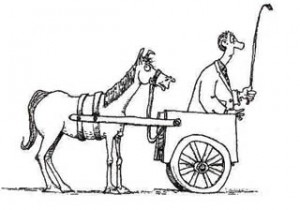Some weeks ago, Kathleen McCoy spent not a few column inches of the local rag in her puff piece lauding UAA’s Terry Kelly, “Ethicist handles heavy issues with a light touch.” Unfortunately, one can only conclude that this is further evidence that UAA is not a real educational destination.

UAA’s Terry Kelly must be more a stand-up comic than an ethicist. According to McCoy, he argued, in the most bizarre example of political correctness to date, that if you act in such a way as to make some one else be suspicious of you, you have acted unethically. Yes, you heard me. By way of example, Kelly offered a homily where a husband and wife pledge to be sexually faithful, and then hubbie goes off to spend Friday nights reading at the whorehouse. Kelly claimed that hubbie is acting unethically because his pathetically insecure wife is banging her head against a wall. Really?
Kelly then went on to confuse matters with a retelling of the Clinton/Lewinsky gaffe, misrepresenting the facts and of course drawing the wrong conclusion. He finally tackled his real target (after an unfortunate attempt to hijack the theory of cognitive dissonance), which appeared to be the impact of government officials receiving gifts. He apparently closed with something along the lines of “trustworthy behavior is persuasive behavior, and untrustworthy behavior is unethical.”
Yes. Instead of arguing that trust is based on ethical behavior, he argues that ethical behavior is based on trust. Very inventive. Or delusional. The word trust comes from the Norse “traust” and is defined by the Cambridge dictionary as “to have belief or confidence in the honesty, goodness, skill or safety of a person, organization or thing.” Trustworthy of course is to be worthy of trust. Ethics, per the Oxford Dictionary, are, “moral principles that govern a person’s behaviour or the conducting of an activity”, and the entry goes on to explain:
Schools of ethics in Western philosophy can be divided, very roughly, into three sorts. The first, drawing on the work of Aristotle, holds that the virtues (such as justice, charity, and generosity) are dispositions to act in ways that benefit both the person possessing them and that person’s society. The second, defended particularly by Kant, makes the concept of duty central to morality: humans are bound, from a knowledge of their duty as rational beings, to obey the categorical imperative to respect other rational beings. Thirdly, utilitarianism asserts that the guiding principle of conduct should be the greatest happiness or benefit of the greatest number
So we can take ethical to mean, depending on the system to which you subscribe, compliance with some code of conduct. In sum, we may have confidence that others may conduct themselves ethically, but if we lack confidence how can that possibly change whether the erstwhile target of out attentions is ethical or not?
What Terry Kelly has proposed is nothing less than a feedback loop, a neurotic echo chamber where what is real is not what you do, but what someone perceives you to do. While in a very primitive form this may hearken back to the social psychology of the ’70s and the concept of the social construction of reality, it beggars the concept of ethics, for it renders ethics dependent on the feedback loop and enables insecurity. You can only be as ethical as you convince your observer you are. He has turned philosophy into advertising, for under his rules, one becomes ethical not by adhering to a code, but by convincing others that one does, and after all, that is what our politicians try to do today, and is exactly opposite of the point we think Kelly was trying to argue. Kelly has shifted the subjective lens, and lost sight of the situation entirely.